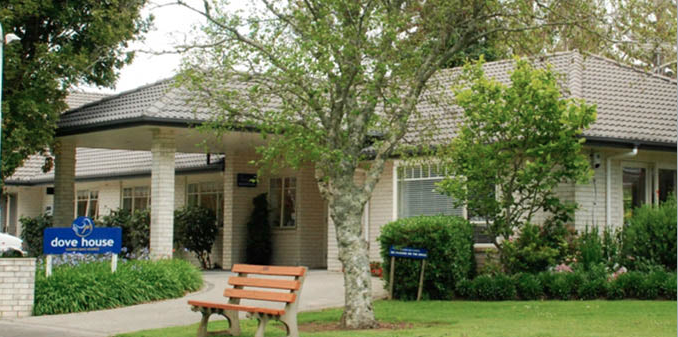“What we do softens what they do,” says Patricia Melville, as she puts sandwiches and tea down in front of me. She’s known as ‘Trish’ at Dove House, and she’s their Clinical Services Manager. “What I mean by that”, she continues, “is that the medical teams that look after these very unwell people, they have to put needles into them, give them chemotherapy and radiotherapy and other painful procedures – it’s necessary, and they can’t not. But what we can do here, is balance all that out with some softness and care.”
I've always been curious about hospices. I visited my first one as a young child, and has since been fascinated about the way they care for people who might not get better. Eastern Bays Hospice was started 20 years ago as a 24 hour local hospice, so people didn’t have to travel far when they become seriously unwell. When they realised they covered the same catchment area as Mercy Hospice and offered similar services, they decided to do things a little differently. Hence the birth of Dove hospice, and now Dove House. They cover the space between the chemo and the palliative care – both of which Trish says is already done very well. So it's not just about end-of-life, but holistic wellbeing, while in the ‘gap’ between diagnosis and and wellness, or diagnosis and end-of-life care. This makes them unique - no other hospice looks after people right from their diagnosis onwards. And of course there’s plenty of scientific evidence that shows the connection between holistic care and better sleep, lowered pain, reduced stress.. all of which are so important when someone is facing the external stress of a threatening illness. As a psychologist, I'm really interested in how the mental health effects of something as devastating as a terminal illness, can be eased by things like massage, support groups or art therapy. Touch has been well-researched for its health benefits, and expression through music and journalling too.
There is still a 24 hour 3 bed unit within the Saint Andrews retirement village, which caters to more traditional ‘end-of-life care’ needs. But Dove House focus is on things that will lift spirits, improve quality of life, and support conventional treatment people are receiving. They look after the wellbeing of people who have been newly diagnosed (usually cancer, but also some other life-threatening illnesses), those with advanced disease but having treatment, and those not expecting remission or recovery.
Among the therapies offered are:
- Nursing and medical support (there’s even a doctor who will help deciper medical terminology and assist with decision making – alongside a patient’s usual doctor)
- Counselling/Emotional Support
- Body Therapies (Aromatherapy/Massage, Reflexology and Guided Breathing)
- Lymphoedema Therapy
- Oncology Massage
- Creative Therapies (Art, Music and Journaling)
- Relaxation Therapies (Reiki, Breathing Works, Yoga)
- Skin and Nail Therapeutic Treatment
- Informative Workshops (e.g., on nutrition, how to talk to children about an illness, about sleep and dreaming)
- and Support Groups (for patients, carers, and the bereaved)
There’s even a small community team that can visit those who are bed-bound in their homes.
On my tour around the building I got to peek into beautiful spa-like facilities, workshop rooms with dieticians getting ready to teach, and counselling rooms, ready to welcome people to talk about the toughest subject: dying. The building had a light, warm, and positive feeling, and I could hear lots of laughter, But it also felt to me as though it had a sense of purpose – a reason to be there.
Something that astounded me completely, was the way that Dove House funds all of its activities, 5000 treatments a year, 15 or so staff, programmes, building maintenance etc. Could you guess? Nope, not government funding.. but from proceeds from Hospice shops! Donations and fundraising help too, but largely the ongoing costs are met by hospice shops. They have 6 of these little beauties, and the proceeds of sales of donated goods goes straight into care provided at Dove.
Trish began as an oncology nurse, and a community nurse with the cancer society, and joined Dove 8 years ago when they needed a clinical services manager. When she talks about all the wonderful things Dove could offer in the future, she lights up and forgets about her tea. She also emphasises that while there are some criteria for people to be accepted for Dove’s care, they try and widen this as much as possible, and says that “if someone is referred here, we will always look at what we can offer, and do our very best”. I know that if someone close to me found themselves in the sad position of having a life-affecting illness - I wouldn't hesitate to suggest they take some time for themselves at Dove House.
- If you’re looking for an ‘op shop’ with a worthwhile cause, visit a Dove Hospice shop. If you have quality clothes or other ‘stuff’ to donate – take it to one of these locations. Or call for a pickup – 09 527 5064.
- If you’d like to volunteer your time and skills, contact their Volunteer Coordinator on 028 258 03000
- If you or someone you know (they don’t have to live near Dove House) has a life-threatening illness, or is recently bereaved, and could use some care, contact Dove. There’s an online referral form at www.dovehospice.org.nz or phone 09 575 4555.
- If you just want to know more about Dove House, Hospice, or Eastern Bays Hospice - visit their website.


